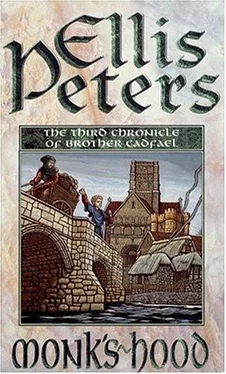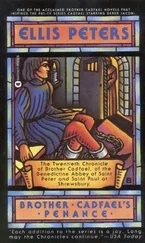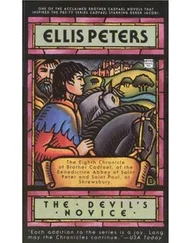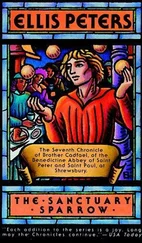The young man, with cheerful practicality, took him at his word, and went on kneading the pungent oils into Brother Rhys’s aged shoulders. He was perhaps twenty-four or twenty-five years old, sturdily built and strong; his square, good-natured face was brown and weathered, and plentifully supplied with bone, a Welsh face, smooth-shaven and decisive, his hair and brows thick, wiry and black. His manner towards Brother Rhys was smiling, merry, almost teasing, as it probably would have been towards a child; and that was engaging in him, and won Brother Cadfael’s thoughtful approval, for Brother Rhys was indeed a child again. Livelier than usual today, however, the visitor had done him a deal of good.
“Well, now, Cadfael!” he piped, twitching a shoulder pleasurably at the young man’s probing. “You see my kinsmen remember me yet. Here’s my niece Angharad’s boy come to see me, my great-nephew Meurig. I mind the time he was born … Eh, I mind the time she was born, for that matter, my sister’s little lass. It’s many years since I’ve seen her—or you, boy, come to think of it, you could have come to see me earlier. But there’s no family feeling in the young, these days.” But he was very complacent about it, enjoying handing out praise one moment and illogical reproof the next, a patriarch’s privilege. “And why didn’t the girl come herself? Why didn’t you bring your mother with you?”
“It’s a long journey from the north of the shire,” said the young man Meurig, easily, “and always more than enough to be done at home. But I’m nearer now, I work for a carpenter and carver in the town here, you’ll be seeing more of me. I’ll come and do this for you again—have you out on a hillside with the sheep yet, come spring.”
“My niece Angharad,” murmured the old man, benignly smiling, “was the prettiest little thing in half the shire, and she grew up a beauty. What age would she be now? Five and forty, it may be, but I warrant she’s still as beautiful as ever she was—don’t you tell me different, I never yet saw the one to touch her… .”
“Her son’s not likely to tell you any different,” agreed Meurig comfortably. Are not all one’s lost nieces beautiful? And the weather of the summers when they were children always radiant, and the wild fruit they gathered then sweeter than any that grows now? For some years Brother Rhys had been considered mildly senile, his wanderings timeless and disorganised; memory failed, fantasy burgeoned, he drew pictures that never had existed on sea or land. But somewhere else, perhaps? Now, with the stimulus of this youthful and vigorous presence and the knowledge of their shared blood, he quickened into sharp remembrance again. It might not last, but it was a princely gift while it lasted.
“Turn a little more to the fire—there, is that the spot?” Rhys wriggled and purred like a stroked cat, and the young man laughed, and plied deep into the flesh, smoothing out knots with a firmness that both hurt and gratified.
“This is no new skill with you,” said Brother Cadfael, observing with approval.
“I’ve worked mostly with horses, and they get their troubles with swellings and injuries, like men. You learn to see with your fingers, where to find what’s bound, and loose it again.”
“But he’s a carpenter now,” Brother Rhys said proudly, “and working here in Shrewsbury.”
“And we’re making a lectern for your Lady Chapel, “said Meurig, “and when it’s done—and it soon will be—I’ll be bringing it down to the abbey myself. And I’ll come and see you again while I’m here.”
“And rub my shoulder again? It gets winterly now, towards Christmas, the cold gets in my bones.”
“I will so. But that’s enough for now, I’ll be making you too sore. Have up your gown again, uncle—there, and keep the warmth in. Does it burn?”
“For a while it prickled like nettles, now there’s a fine, easy glow. I don’t feel any pain there now. But I’m tired …”
He would be, tired and drowsy after the manipulation of his flesh and the reviving of his ancient mind. “That’s right, that’s well. Now you should lie down and have a sleep.”
Meurig looked to Cadfael to support him. “Isn’t that best, brother?”
“The very best thing. That’s hard exercise you’ve been taking, you should rest after it.”
Rhys was well content to be settled on his bed and left to the sleep that was already overtaking him. His drowsy farewells followed them towards the door, to fade into silence before they reached it. “Take my greetings to your mother, Meurig. And ask her to come and see me … when they bring the wool to Shrewsbury market … I’m fain to see her again …”
“He set great store by your mother, it seems,” said Cadfael, watching as Meurig washed his hands where Brother Edmund had shown him, and making sure that he was thorough about it. “Is there a hope that he may see her again?”
Meurig’s face, seen in profile as he wrung and scrubbed at his hands, had a gravity and brooding thoughtfulness that belied the indulgent gaiety he had put on for this old man. After a moment he said: “Not in this world.” He turned to reach for the coarse towel, and looked Cadfael in the eyes fully and steadily. “My mother has been dead for eleven years this Michaelmas past. He knows it—or he knew it— as well as I. But if she’s alive to him again in his dotage, why should I remind him? Let him keep that thought and any other that can pleasure him.”
They went out together in silence, into the chilly air of the great court, and there separated, Meurig striking across briskly towards the gatehouse, Cadfael making for the church, where the Vesper bell could be only a few minutes delayed.
“God speed!” said Cadfael in parting. “You gave the old man back a piece of his youth today. The elders of your kinship, I think, are fortunate in their sons.”
“My kinship,” said Meurig, halting in mid-stride to stare back with great black eyes, “is my mother’s kinship, I go with my own. My father was not a Welshman.”
He went, lengthening a lusty stride, the square shape of his shoulders cleaving the dusk. And Cadfael wondered about him, as he had wondered about the villein Aelfric, as far as the porch of the church, and then abandoned him for a more immediate duty. These people are, after all, responsible for themselves, and none of his business.
Not yet!
It was nearing mid-December before the dour manservant Aelfric came again to the herb-gardens for kitchen herbs for his mistress. By that time he was a figure familiar enough to fade into the daily pattern of comings and goings about the great court, and among the multifarious noise and traffic his solitary silence remained generally unremarked. Cadfael had seen him in the mornings, passing through to the bakery and buttery for the day’s loaves and measures of ale, always mute, always purposeful, quick of step and withdrawn of countenance, as though any delay on his part might bring penance, as perhaps, indeed, it might. Brother Mark, attracted to a soul seemingly as lonely and anxious as his own had once been, had made some attempt to engage the stranger in talk, and had little success.
“Though he does unfold a little,” said Mark thoughtfully, kicking his heels on the bench in Cadfael’s workshop as he stirred a salve. “I don’t think he’s an unfriendly soul at all, if he had not something on his mind. When I greet him he sometimes comes near to smiling, but he’ll never linger and talk.”
“He has his work to do, and perhaps a master who’s hard to please,” said Cadfael mildly.
“I heard he’s out of sorts since they moved in,” said Mark. “The master, I mean. Not really ill, but low and out of appetite.”
Читать дальше












